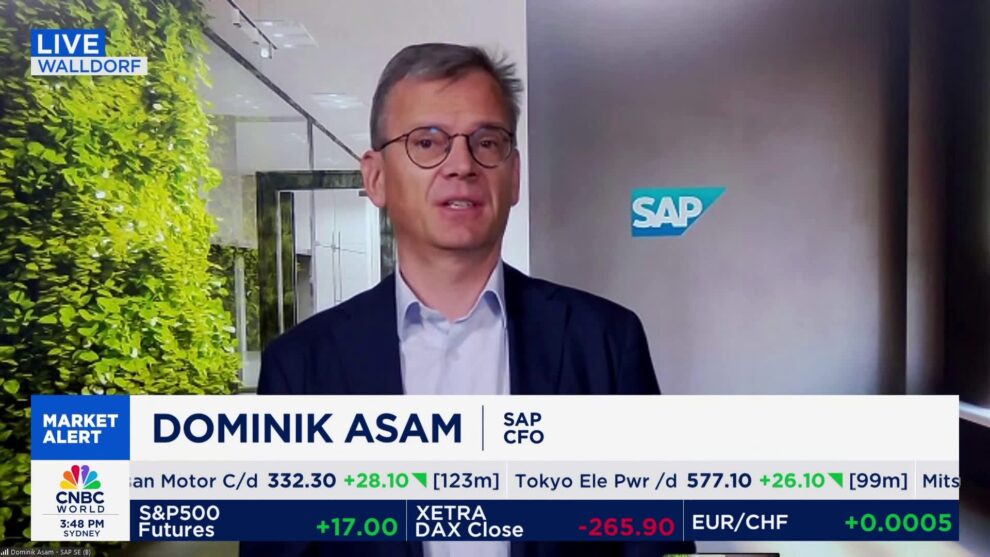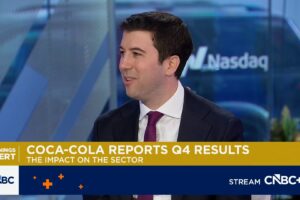A person holds a smartphone displaying the logo of SAP, a German multinational software corporation known for its enterprise resource planning solutions.
Cheng Xin | Getty Images News | Getty Images
German software giant SAP said Wednesday that U.S. tariff tensions were slowing down its customers’ decision-making, but that the Japan trade deal announced Tuesday was cause for cautious optimism.
“In some sectors which are most affected by these [policy] decisions, like public sector U.S. and also the very big manufacturing industrial companies with complicated global supply chains, there was the one or other large transaction which has slipped over the turn of the last quarter,” SAP Chief Financial Officer Dominik Asam told CNBC’s “Europe Early Edition.”

Deals were not disappearing entirely, but approvals were being passed higher up the chain of command and holding up processes due to uncertainty, he noted.
“Now we have to see how quickly we can catch up. That is very much a question of how the overall environment will evolve. I mean, obviously the most recent developments in Japan give us some hope, but too early to speculate on that,” Asam said.
“The faster the uncertainty abates, the more confidence we have in the outcome for the full year,” he added.
SAP in March became Europe’s biggest listed company, overtaking French luxury group LVMH and Ozempic-maker Novo Nordisk in market capitalization, after pivoting the business firstly toward cloud computing and then toward opportunities in artificial intelligence.
SAP now brings in the majority of its revenue from cloud services, and has focused on how AI can tap into its huge set of finance, sales and supply chain data to make efficiencies for businesses.
The U.S. is one of its core markets, and investors have been questioning how SAP would be impacted by a potential pullback in spending as the administration of President Donald Trump engages in tense trade disputes and tariff negotiations with much of the world.
The status of any framework deal with the European Union remained mired in uncertainty as of Wednesday, but global stock markets were buoyed by the announcement Tuesday of an agreement with Japan setting tariffs on its exports to the U.S. at 15%.

Mixed results
SAP reported late on Tuesday a 9% year-on-year revenue rise to 9.03 billion euros ($10.6 billion) in the second quarter, just shy of an LSEG-compiled consensus forecast of 9.08 billion euros. Operating profit was just ahead of estimates at 2.57 billion euros.
The company reiterated its full-year 2025 outlook, despite noting that the “prevailing dynamic environment implies elevated levels of uncertainty and reduced visibility.”
On an analyst call Tuesday, CEO Christian Klein said SAP was seeing “strong momentum” from the recent national security spending push in Europe, which has driven massive gains in defense stocks this year, some of which are SAP customers.

SAP share price.
Its current cloud backlog, a key metric for the firm, was up 28% on a constant currency basis to 18.05 billion, which analysts at Deutsche Bank said were “strong” in a Wednesday note.
“Overall, we see SAP continuing to execute very well in a challenging environment, helped by its strong product offerings, AI roadmap and structural long-term Cloud migration projects. New wins included landmark customers such as Alibaba in Q2,” the Deutsche Bank analysts said.
However, other reactions were less positive, with analysts at TD Cowen and Piper Sandler trimming their target prices on the stock.

Share moves in SAP, Novo Nordisk and LVMH.
One drag on the results came from fluctuations in foreign exchange rates, particularly weakness in the U.S. dollar against the euro, in which SAP reports. The firm forecast a 5 percentage-point drag on cloud revenue growth figures in the third quarter, assuming exchange rates as of June 30.
SAP’s Frankfurt-listed shares were 3.5% lower in early deals on Wednesday.












